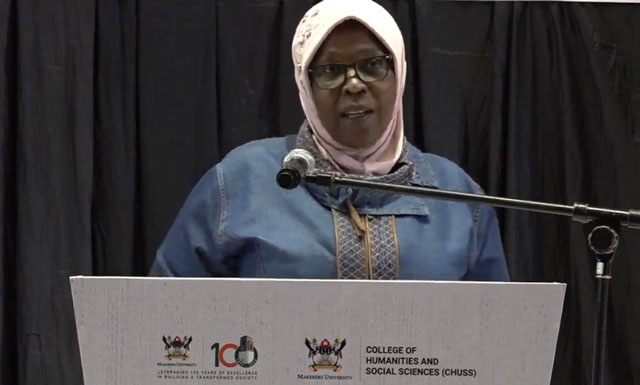
Kampala, Uganda | THE INDEPENDENT | Dr. Saudah Namyalo Birabwa has broken through the proverbial glass ceiling to become the second Muslim female Associate Professor in Uganda. With her promotion last month, Professor Namyalo, who is the Dean of the School of Languages, Literature, and Communication at Makerere University, looks back at a journey marked by resilience and a thirst for knowledge.
Although some sources first declared her as the first Female Muslim to become an associate professor, Uganda Radio Network has learned that feat had already been claimed by Sarah Nachuha, who is an Associate Professor of Zoology at Kabale University. Dr. Madina Nabukeera, the director of the Islamic University in Uganda (IUIU) Female Campus, says that Namyalo’s achievement is still remarkable.
“She holds the second position in that place, though that’s not the focal point. The achievement deserves celebration within the Muslim community. We’ve lagged behind in terms of secular education, but this breakthrough is significant. Back during independence, only two Muslim graduates existed in Uganda, both of whom were male,” said Madina, who has also been promoted to Associate professor.
Dr. Nabukeera further highlights that historically, very few Muslim women had access to secular education, as many were confined to studying religious education informal settings alias “Kabalaza,” where they received instructions on the verandas of community sheikhs. Numerous sources we consulted during the compilation of this report corroborate the argument.
One of these documents, “Muslim Women Education in Uganda: History and Contributions”, authored by Aisha Aiseta and Musa Luwemba, note that up until 1990, Makerere University had produced fewer than 30 female Muslim graduates. The educational disadvantage faced by female Muslims presents itself in multiple facets. One aspect is linked to the perception that Muslims in general contend with educational marginalization within Uganda.
However, even as Muslims began to access secular education, a significant disparity emerged. Muslim girls were often excluded. Many parents turned to Islamic instruction and prohibited their daughters from attending formal schools.
The Story begins
Born in the early 1970s in the coffee-rich Bukomansimbi, then a sub-county in Masaka district, Namyalo is the fourth born of her parents’ five children. Her father, Sheikh Umar Mayanja, possessed a reasonable level of education and served as a spiritual leader, while her mother, Hajjat Hafsa Najjemba, assumed the role of a homemaker.
The Namyalo family enjoyed a comfortable financial status, which allowed them to afford adequate housing, clothing, and education, all made possible by their coffee cultivation. Like every other girl in her village, she was registered at Ntuuma Qur’an Primary School. She recalls that back then, girls could study up to primary five and many would spend one to two years at home before going into marriage.
Taking our reporters down memory lane, Namyalo recollects that she experienced a similar situation when she completed her fifth year of primary school. Her family members suggested that she had received sufficient education and should come back home to prepare for marriage.
Nonetheless, her destiny took a positive turn thanks to her elder brother, Hajj Swaibu Mukalazi, who could be likened to a kingmaker. He successfully won the battle within the family, allowing her to enroll at Kako Primary School in 1983 to continue with her education. However, this decision didn’t sit well with everyone. Firstly, the idea of a girl pursuing “higher secular education” met resistance.
Besides that, she was joining a Church of Uganda school. She, however, adds that over time, many became convinced to let her continue with her studies, partly due to the late Hussein Kyanjo, one of the family members who had attended Kijabwemi Primary School, another institution established by the Church of Uganda.
The atmosphere at Kako was novel and entirely distinct from her surroundings. Nevertheless, Namyalo concluded her primary education the subsequent year, standing out as one of the top candidates with six (6) aggregates. She proceeded to enroll at Kako Secondary School, where she completed her Ordinary and Advanced level education.
Muslim girls pulled by tradition and religion
Namyalo recalls that her education journey at Kako schools was far from smooth. During every term break, proposals were presented to arrange her marriage with affluent men. She vividly imitates her family members, quoting the phrase “Omwana akuliridde,” which loosely means she was overgrown.
“This term, they would arrange for a particular sheikh, and then another. At one point, I even contemplated leaving Islam, questioning why my family was pressuring me into marriage when I still desired to pursue my education,” Namyalo narrates, describing the repetitive demands as very emotionally draining. The question of marriage was prevalent in the school life of several girls during Namyalo’s school days at Kako. She remembers when a suitor was brought to one of her relatives while at school and soon, she was married off.
Her mother, like many mothers, believed that accepting a marriage proposal from a wealthy man was the wisest choice for her daughter. She consistently encouraged her to seize the rare opportunity before it vanished.
However, it was only Namyalo’s elder brother, Hajj Swaibu Mukalazi, who was also supporting her education who rejected the marriage proposals. In earlier times, numerous cultures in Uganda married off girls as soon as they showed physical signs of maturity, such as developing breasts or experiencing their first menstrual periods.
Education was not deemed as essential for girls as it was for boys. Associate Professor Namyalo was fortunate to have a relatively educated father who recognized the value of education, albeit to a limited extent. Her brother, Mukalazi, had completed his education up to the junior level and was teaching at a school in Bukomansimbi, which further emphasized their dedication to education.
However, her other siblings did not progress beyond senior two and entered into marriage. Yet, apart from cultural norms, Islam emphasizes the promptness of marriage. This likely explains why, upon joining secondary school, the majority of her family members considered Namyalo mature enough to marry. Fortunately, Namyalo defied all odds and gained admission to a university, completing her undergraduate degree with a second-class honors degree in education.
Encouraged by figures such as her former lecturer Aloysius Matovu Joy, she successfully applied for a teaching assistant position at the university. Additionally, she pursued a Master’s degree and a postgraduate diploma in the translation and interpretation of Luganda, English, and Arabic languages. Subsequently, she embarked on her Ph.D. and postdoctoral studies, which have led her to her current achievement. And so, her journey continues.
Accidental linguist?
Namyalo is an associate professor of linguistics, specializing in Luganda. If destiny is anything to go by, her story with the language is quintessential. Despite her initial aspirations to pursue science, her trajectory shifted in Senior Four when she encountered challenges with Chemistry.
Rejecting an unconventional subject combination, she embraced arts and studied History, Economics, and Geography. She studied the three subjects until senior six when she was informed that she might struggle to enter Makerere University unless she added a fourth subject. Being a Muganda, she decided that studying Luganda would not be much of a hurdle.
Navigating her way through the complexities of Luganda, Namyalo’s determination shone through. She undertook self-study, undeterred by a teacher’s reluctance to admit her into the Luganda class. As she recalls, “I got books and started reading… the teacher said he cannot allow me since I had not been studying.”
Her resolve paid off as she excelled in Luganda examinations, a subject she had unintentionally stumbled upon. Her academic journey wasn’t without hurdles. A mysterious ailment disrupted her speech shortly before her final exams, yet she persevered and achieved exceptional results. “I was the best in that cohort. I was surprised and so was everyone,” Namyalo shares.
Destiny had more surprises in store. Her initial plan to pursue Social Works and Social Administration transformed into a specialization in Arts Education, majoring in History and Luganda. Despite this unexpected direction, Namyalo embraced her studies, even as she pondered changing languages.
“So I was stuck with my Luganda. But Alhamdulillah (All praise is due to Allah), immediately after my first degree, my teachers retained me. I’ve never sat for an interview; I’ve never looked for a job.” she says, describing how her journey into becoming an academic started.
Raising to the rank of associate professor, Namyalo becomes the third woman in the history of the Department of Linguists to raise that high at Makerere University.
Studies, parenting, and family
Balancing marriage and academia poses a significant challenge for female scholars, often leading to broken marriages or compromised academic dreams due to a lack of spousal support. Namyalo, a Muslim Muganda woman and mother of five, says she has navigated this struggle by making sacrifices, like sending her children to boarding school.
Her last born, for instance, joined boarding school while in lower primary. She at onetime left her behind as a 10-month-old baby to go to Germany in pursuit of her Ph.D.
Muslim Women in Academia
The presence of Muslim women in academia is a topic that evokes both pride and concern for Namyalo. While she takes pride in her accomplishment, she also recognizes the weight of responsibility it carries. Namyalo’s sentiment is clear: the existence of only two associate professors (now three) from the Muslim community in a larger academic landscape highlights the need for significant progress.
She raises pertinent questions about the trajectory of Muslim women after obtaining their first degrees. “Do they remain content with a single degree, or are there barriers, such as lack of support from spouses, hindering their pursuit of further education?” Namyalo acknowledges that a variety of factors, some yet unidentified, could contribute to this situation.
Calling upon Muslim leaders irrespective of political affiliations or factions, Namyalo urges a collective effort to address this issue. She seeks a practical and effective solution to encourage and facilitate the academic progression of Muslim women.
Sheikat Radhiyyah Namakula, the Secretary for Women, Youth, and Children Affairs at Uganda Muslim Supreme Council-UMSC, says Namyalo’s achievement amid that the challenges faced by female Muslims is a significant breakthrough. She observes that since the 1970s, attempts have been made to educate Muslim girls, and she believes these efforts are now yielding positive results.
Sheikat Namakula points out that a considerable number of female Muslims have successfully attained PhDs, and if the current trend continues, the number of female Muslim professors in academia is likely to increase in the future.
Affirming her own pioneering role, Associate Professor Sarah Nachuha acknowledges that witnessing another woman attain such remarkable achievements serves as a profound wellspring of motivation. With a deep and sincere conviction, she extends her aspirations in fervent prayers, yearning for the removal of the barriers that have hindered the advancement of female Muslims.
****
URN
 The Independent Uganda: You get the Truth we Pay the Price
The Independent Uganda: You get the Truth we Pay the Price



